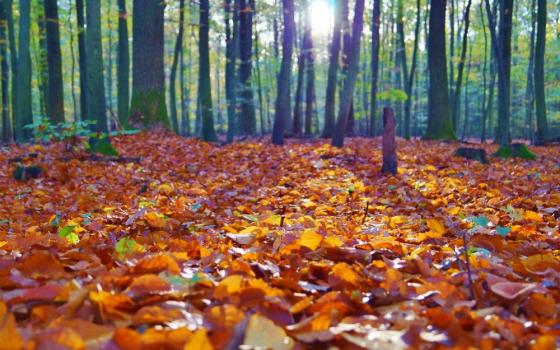The wind has a bite in it. The air is crisp. Sun pours down through the tree branches, which are still clothed but now with a vibrant array of colors — gold, red, purple, orange, pink, magenta, blue and brown. A little later, these leaves will flutter to the ground and attract in a different way. Piles of leaves invite you to return to your childhood as you run right into them and crunch them beneath your feet. Your senses alive to the beauty of nature and of our Earth home.
Stopping and taking time to engage the beauty of autumn, as the leaves regale us with their beauty and beckon us to come closer and see nature in new ways, may be a key way to respond to the urgency of climate change.
The Oct. 8, 2018 U.N. report from the Intergovernmental Panel on Climate Change (IPCC) states that a global temperature rise of 1.5 degrees Celsius (2.7 degrees Fahrenheit) is the threshold the planet cannot cross without suffering some of the worst effects of climate change. Temperatures have already risen 1 degree Celsius (since pre-industrial times), and unless significant changes are made in the global commitment to alter policies and practices the planet could pass the threshold by 2030.
Even in the face of such an alarming forecast based on factual data, there are still people who do not accept this reality. The data seems so clear, and yet many are not moved. For some, it is too complex. Others believe the people in power, who say it is not such a big problem. And still others are so scared at such a possibility that they simply refuse to see it.
Perhaps one of the greatest reasons for resistance is that the reality of climate change demands that we change. To change the lifestyle to which we have become accustomed. To stop our dependence on fossil fuels, which in turn decreases the profits and the power of all the related industries and corporations. To alter our habits of consumption and disposal. To transform how we view the role of the human in the enterprise we call life.
To take in the threat of climate change, we must acknowledge our connectedness with each other on this planet Earth no matter where we live. We must see that what we do as the human species affects all other sentient and non-sentient beings, as well as the very chemistry of the atmosphere itself. We must acknowledge that we are in service to the future generations of all species and to the planet.
These realizations do not come from data alone.
It may seem counterintuitive, but I believe what we are learning about climate change and the urgency to address it is actually inviting us to stop and become aware of our earthly surroundings. To take time to go outside, to walk in parks and sit by the water. To hear the rustling of the leaves or the singing of the wind. To feel the caress of the breeze or the chill of the air. To take the time to watch the changing leaves or flocks of geese flying south — reminding us of the cycle of life/death and the value of migration across borders. To become one with our surroundings.
Climate change is the bellwether of recognition that what happens to our atmosphere happens to each of us and that our future depends on the health of the planet.
It seems to me that inviting people for whom climate change is not important to "take a long loving look at the real" that surrounds us in our natural habitat is a first step toward understanding why climate change needs to be addressed now.
We need to encourage people to engage with nature — perhaps with a forest — in a contemplative way. To come and sit within nature's cathedral. To sit or lie down allowing one's body to feel Earth and to become truly "grounded." To relax and breathe deeply, to take in the various sensations of nature's carpeted floor. To follow one's breath. In the silence of the space to let go of all our preconceived notions of nature and humans — all the ways we have been told we are so separate and different — to let go and simply encounter what is.
I believe that encounter, where our "roots" join, will lead to startling discoveries. We need to stay in that deep space to hear what one can never hear in the hustle and bustle of a world that primarily sees trees, plants, insects, animals, minerals and precious metals as mere commodities for the use of humans.
It will lead to an understanding that our futures are connected. Both humans and nature want to live fully into the future. Both must do what they can to insure a healthy planet. It seems nature is trying to do its part. It is incumbent on us to do ours.
[Nancy Sylvester is founder and director of the Institute for Communal Contemplation and Dialogue. She served in leadership of her own religious community, the Sister Servants of the Immaculate Heart of Mary, Monroe, Michigan, as well as in the presidency of the Leadership Conference of Women Religious. Prior to that, she was national coordinator of Network, the Catholic social justice lobby.]

